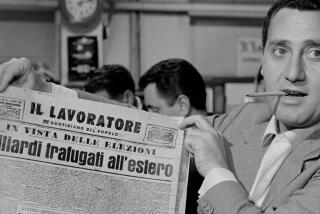More Than Oscars Riding on Benigni’s ‘Life’
- Share via
ROME — Italy’s state television plans to air a “Roberto Benigni Day” tribute hours before Sunday’s Academy Awards ceremony. Another Italian channel will air the event live, and is even setting up cameras in Vergaio, the Tuscan town where the comedian and Oscar contender grew up.
“There’s so much enthusiasm--too much, frankly,” said Vincenzo Cerami, co-writer with Benigni of “Life Is Beautiful” (“La Vita e Bella”), the biggest-earning export in Italian film history. “I’m worried. What if we come back without an award?”
The tale of a Jewish father whose humor shields his little son from the horrors of a Nazi death camp is up for seven Oscars, including awards for Benigni as best director and best actor. But the hype in Italy over Oscar night is about more than a native son’s drive for international acclaim; it is about Italy’s perennial hope for a renaissance of its cinema.
The country that produced “The Bicycle Thief,” “The Leopard” and “La Dolce Vita” in the first two decades after World War II ran out of cinematic inspiration in the early 1970s and has been struggling ever since. Benigni’s film, first screened here in December 1997, is a shot in the arm.
Winner of 29 international prizes, it has already broken the U.S. box-office record for foreign language films, and among current European films it trails only British comedy “The Full Monty” in worldwide earnings.
Italian Prime Minister Massimo d’Alema called it “a beautiful film.” Pope John Paul II, once an object of Benigni’s comic ridicule, had the director over for a private screening.
“It makes you think,” the pope said, “that not only in this concentration camp but in many others we can find saints.”
Italian Jews, after some initial criticism of the film as a “fairy tale” that trivialized the Holocaust, have come to praise it.
“Benigni represents this country’s best quality of intelligence--that sophisticated wit and way of looking at the world that Italians have,” said Franco Pavoncello, culture commissioner of Rome’s Jewish community.
Weary of lamenting their movie industry, Italian critics have seized on the film as a hopeful sign.
“It has breached the corporate wall of English-language cinema, which is out to conquer the world,” Tullio Kezich wrote in the newspaper Corriere della Sera. “European movie makers should be inspired by the example of a small film that has emerged solely by virtue of its talent and good faith, without a huge budget, without humiliating compromises.”
“We’re tired of exporting only fashion,” added critic Maurizio Porro. “Benigni could be the start of a new moment for Italian film.”
Italians have heard such predictions before--after Oscars for Giuseppe Tornatore’s “Cinema Paradiso” in 1989, Gabriele Salvatores’ “Mediterraneo” in 1991 and “The Postman” in 1995--but the renaissance never arrived.
The industry, described last year by the culture minister as “essentially extinct,” is plagued by an Italian distribution monopoly that saturation-bombs theaters with foreign and Italian blockbusters while often overlooking home-grown creative gems.
Veteran Italian filmmaker Franco Zeffirelli says the problem is that few directors aim for a universal audience. Unless they follow Benigni’s lead, he says, his success will do nothing for Italy.
“Benigni could be French, he could be Dutch, he could be anything; he’s himself,” Zeffirelli said. “His triumph does not express the potential of Italian cinema. It expresses Benigni.”
More to Read
Only good movies
Get the Indie Focus newsletter, Mark Olsen's weekly guide to the world of cinema.
You may occasionally receive promotional content from the Los Angeles Times.







